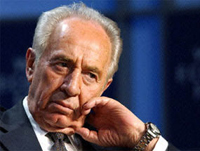Israel and Palestine mark 60 years of Holy Land's split into two states

It was sixty years ago when the U.N. proposed to split the Holy Land into separate Jewish and Arab states - a concept that remains at the heart of Middle East peacemaking efforts.
The Nov. 29, 1947, plan, which was welcomed by Jews but rejected by Arabs at the time, created the idea of dividing what was then British-ruled Palestine between the two peoples. This week, the "two-state solution" was at the center of efforts to relaunch Israeli-Palestinian peace efforts at a U.S.-hosted conference in Annapolis, Maryland.
At the summit, Palestinian President Mahmoud Abbas and Israeli Prime Minister Ehud Olmert pledged to reach a peace deal by the end of next year.
While the 1947 "partition plan" was never implemented, it paved the way for the creation of the state of Israel, and its recognition by the U.N., the following year. After rejecting the plan, local Arabs spent the next six decades under Jordanian, Egyptian and Israeli rule or became refugees in neighboring countries.
For Palestinians the day is one of regret, marked by an international day of solidarity with their cause. Israel sees it as a happy occasion and streets in Israeli cities are named after the date.
Olmert lived in a house on 29th November Street in Jerusalem before becoming prime minister. He is scheduled to address a special session of Israel's parliament early next week marking the anniversary.
Israel's U.N. Ambassador, Dan Gillerman, told Army Radio he would deliver an address marking the anniversary at the General Assembly later Thursday.
"Today when I stand on the podium at the U.N. our message will be that we should bring the spirit of Annapolis into this glass building," he said.
The 1947 plan, contained in General Assembly resolution 181, proposed dividing what is now Israel, the West Bank and the Gaza Strip. It would have put Jerusalem and its holy sites under international control because of competing claims that are still at the heart of the Israeli-Palestinian conflict.
The territory offered to the Arabs then was significantly more than what the Palestinians are seeking now: a state in the West Bank, Gaza and east Jerusalem, areas captured by Israel in the 1967 Mideast war.
Israeli President Shimon Peres said the Palestinians' lowered expectations have made it easier to forge a final peace accord. Under the Oslo interim peace accords, the Palestinians scaled back their demands to the pre-1967 borders.
"It was the greatest achievement of Oslo in my opinion," he told the radio. "It laid the foundation for peace."
In an address to the General Assembly marking the Palestinian solidarity last year, Abbas referred to resolution 181 as "the beginning of our people's ongoing tragedy."
An unidentified resident of the large Israeli Arab town of Um el-Fahm told Army radio it had been a costly mistake to reject the original proposal.
"If they had accepted the partition plan it seems to me that long ago there would have been two states for two peoples," he said. "We would have been spared all the wars and the mess that there has been since then until today."
Subscribe to Pravda.Ru Telegram channel, Facebook, RSS!


